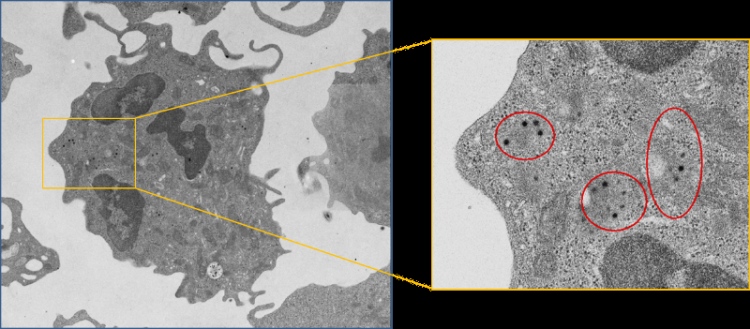Viruses generally attack the body and cause harm, but some viruses specifically target and destroy cancer tissue while causing minimal side effects to the patient, making them an attractive new type of cancer treatment, known as oncolytic virus therapy.
Patients receiving injections of virus therapy into the bloodstream in clinical trials quickly developed antibodies which could potentially deactivate the virus, and this was previously believed to stop it functioning. However, new research shows that white blood cells, which can carry the virus to the tumor site, can also reactivate these deactivated viruses, allowing them to infect and kill the cancer cells. The study, published in the journal Cancer Immunology Research, was carried out by an international team of scientists involving the Leeds Institute of Cancer and Pathology in the UK, the Leiden University Medical Centre, the Netherlands, and the Mayo Clinic, in the USA, and Oncolytics Biotech Inc. (Canada).
This discovery suggests that cancer treatments using virus therapy could be significantly expanded in future, as it was previously believed that follow-up doses were useless once the body had produced antibodies against the virus. It is exciting to learn that our bodies are actually capable of helping the viruses to destroy tumors.
Using antibodies from patients undergoing virus therapy, the researchers neutralized viruses and added them to melanoma cells in the laboratory, which on its own had no effect. But adding white blood cells, called monocytes, meant the virus became reactivated, allowing it to destroy the cancer cells.
At present, these cancer-killing viruses work really well when injected directly into the site of a tumor – but that means the tumor has to be somewhere in the body that you can reach with a needle.
The study shows that, crucially, viruses retain their cancer-killing ability even in the bloodstream. This research has profound implications for how we might use viruses to treat cancer in future, opening up virus therapy to many more patients with hard-to-reach tumors of different cancer types. Currently, a number of viruses are being tested in clinical trials, but only one virus has been approved for general use, by injection directly to the tumor. The researchers hope that this study will help us gain a better understanding of how virus therapies work, so that they can be used in combination with other immunotherapies in future (2)

This electron microscope image shows white blood cells containing virus particles (shown in red circles). White blood cells can reactivate the virus as it travels to the tumor site, allowing it to retain its cancer-killing ability. Image credit: Light and Electron Microscopy Facility, Leiden University Medical Centre.
Reference:
- Berkeley RA, Steele LP, Mulder AA, van den Wollenberg DJM, Kottke TJ, Thompson J, Coffey M, Hoeben RC, Vile RG, Melcher A, Ilett EJ. (2018) Antibody-Neutralized Reovirus Is Effective in Oncolytic Virotherapy. Cancer Immunol Res; 6(10); 1161-1173
- Kemp V, van den Wollenberg DJM, Camps MGM, van Hall T, Kinderman P, Pronk-van Montfoort N, Hoeben RC. (2019) Arming oncolytic reovirus with GM-CSF gene to enhance immunity. Cancer Gene Ther. (in press)



